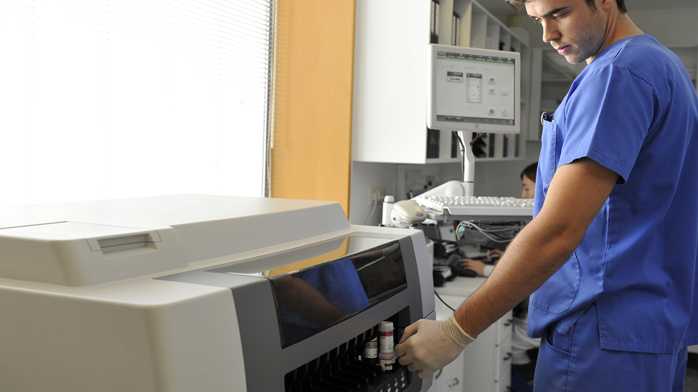Hormone analyses and fertility

How can we help you?
Non-obligation guidance
The concept of fertility refers to a living thing’s ability to reproduce and provide offspring. In order for this to happen, the male and female genital apparatuses need to be both anatomically and functionally normal.
We say that a couple is infertile when, following a year of regular sexual intercourse without contraceptives, they have not managed to achieve a successful pregnancy. At that point, and further to a consultation with a gynaecologist specialising in reproductive medicine, the couple undergoes a number of tests to determine the possible causes of their issues conceiving.
How do hormones affect fertility in women?
Hormone-based fertility checks are performed on both men and women.
The hormones in question are freed into the blood stream and play an essential role in human reproduction. Therefore, abnormalities in the quantity or in the precise moment that they need to be secreted can explain cases of infertility.
A hormone analysis in women performed alongside an ultrasound scan aims to assess ovarian reserve. The analysis needs to be performed under basal conditions. That is, between days 3 and 5 of her menstrual period. The general hormonal tests that are performed include the ones indicated below.
- FSH (follicle-stimulating hormone): in women, it acts on the follicles in the ovary and stimulates their collection and growth. It initiates secretion of oestradiol, the female sex hormone.
- LH (luteinising hormone): it controls follicle maturation, ovulation, initiation of the corpus luteum and secretion of progesterone.
- Oestradiol: on the whole, is it produced by the ovaries, more specifically by the granulosa cells in oocytes.
What do female hormonal abnormalities consist of?
When levels of FSH and/or oestradiol obtained under basal conditions are too high, this suggests poor ovarian reserve and, as a result, limited chances of getting pregnant naturally. A suspicion of this kind needs to be confirmed with an ultrasound scan and an antral follicle count.
Based on medical criteria and depending on each patient's circumstances, it is also possible to determine levels of hormones such as progesterone, testosterone and prolactin. Abnormalities in these levels can also complicate getting pregnant naturally.
What is anti-Müllerian hormone?
It is important to point out that this hormone analysis has its limitations because there can be variations between one menstrual cycle and another. Therefore, it has fallen into disuse over the last few years. Currently, anti-Müllerian hormone (AMH) levels are tested instead. This hormone is produced by the antral and preantral follicles in the ovary and it has the advantage of having stable levels throughout the entire menstrual cycle. As mentioned above, an ultrasound scan under basal conditions needs to be performed so that it can be assessed by your gynaecologist in conjunction with the AMH levels that have been obtained.
How do hormones affect fertility in men?
In men, the first analysis that needs to be performed is a semen analysis and, when there is a very severe abnormality in the number of spermatozoa (criptozoospermia) or a total absence of spermatozoa (azoospermia), then a male hormone analysis may be appropriate. On the whole, the hormone levels that need to be checked are the ones indicated below.
- FSH: in men, it stimulates spermatozoa production.
- LH: it favours androgen secretion, mainly testosterone.
- Testosterone: it is the main male sex hormone and it is produced by the Leydig cells in the testes.
What do male hormonal abnormalities consist of?
Low levels of these hormones can explain poor semen quality. This might mean that the male partner should begin pharmacological treatment if the specialist considers that this is an appropriate course of action.